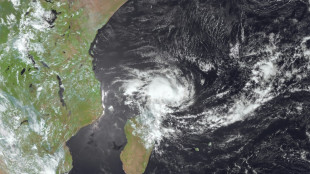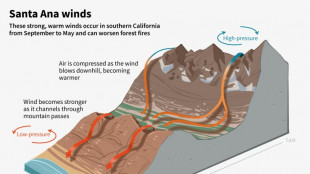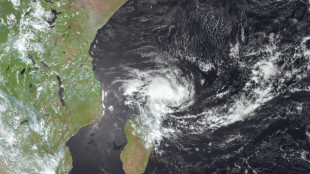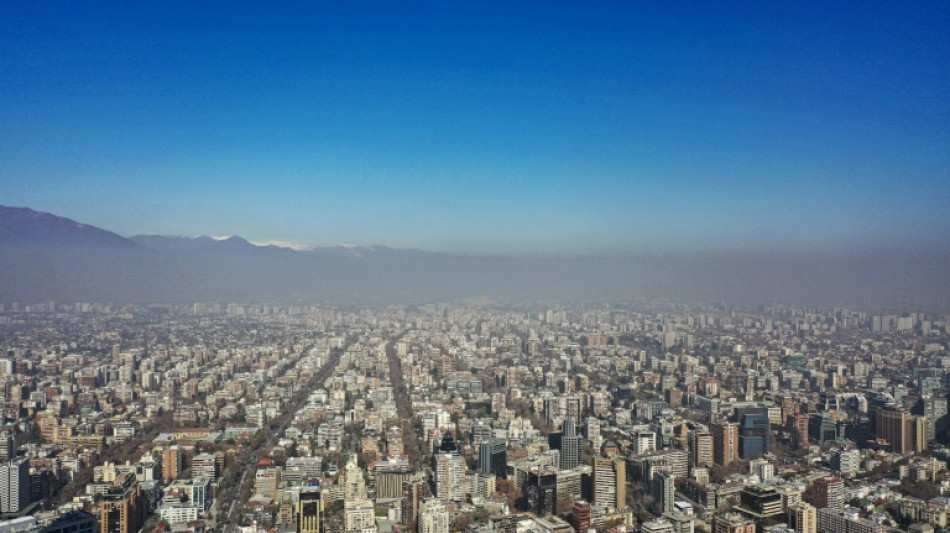
-
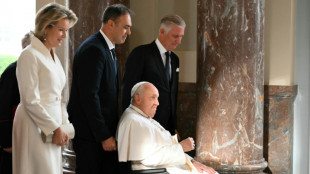 Pope Francis bruises arm in fall at Vatican
Pope Francis bruises arm in fall at Vatican
-
Arsenal optimistic in Premier League title race: Raya

-
 EU announces 120 mn euros in Gaza aid after ceasefire
EU announces 120 mn euros in Gaza aid after ceasefire
-
Patients dying in corridors as UK hospital standards 'collapse': report

-
 Sinner roars back in Melbourne as Swiatek sets up Raducanu clash
Sinner roars back in Melbourne as Swiatek sets up Raducanu clash
-
'Nervous' teen star Fonseca out of Australian Open after thriller

-
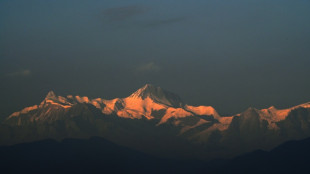 Nepal's top court bars infrastructure in protected areas
Nepal's top court bars infrastructure in protected areas
-
Stock markets jump as inflation worries ease

-
 Sinner drops rare set en route to Australian Open third round
Sinner drops rare set en route to Australian Open third round
-
China to probe US chips over dumping, subsidies

-
 Israel accuses Hamas of backtracking on fragile ceasefire deal
Israel accuses Hamas of backtracking on fragile ceasefire deal
-
Chinese apps including TikTok hit by privacy complaints in Europe

-
 Blasts in Kyiv as UK's Starmer visits to ink '100-year' accord
Blasts in Kyiv as UK's Starmer visits to ink '100-year' accord
-
Hong Kong mogul Jimmy Lai grilled over US, Taiwan ties

-
 Pakistan, West Indies seek to improve from Test Championship lows
Pakistan, West Indies seek to improve from Test Championship lows
-
Trauma and tragedy in the City of Angels: covering the LA fires

-
 Spain raises flag at Damascus embassy after 12-year closure
Spain raises flag at Damascus embassy after 12-year closure
-
Teen star Fonseca out of Australian Open in five-set thriller

-
 Travel agencies say North Korea reopens border city to tourism
Travel agencies say North Korea reopens border city to tourism
-
India's outcast toilet cleaners keeping Hindu festival going

-
 Apple loses top spot in China smartphone sales to local rivals
Apple loses top spot in China smartphone sales to local rivals
-
Sri Lanka signs landmark $3.7 bn deal with Chinese state oil giant

-
 'I had 10 minutes': Lys makes most of Australian Open second chance
'I had 10 minutes': Lys makes most of Australian Open second chance
-
Spanish FM raises flag at Damascus embassy after 12-year closure

-
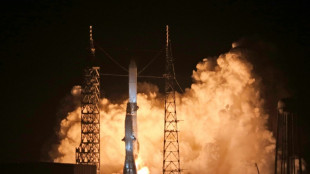 Blue Origin's New Glenn rocket blasts into orbit for first time
Blue Origin's New Glenn rocket blasts into orbit for first time
-
UK economy rebounds but headwinds remain for govt

-
 Rice fields turned into art in northern Thailand
Rice fields turned into art in northern Thailand
-
Stocks follow Wall St higher on welcome US inflation data

-
 South Korea's president arrest: what happens next?
South Korea's president arrest: what happens next?
-
Blue Origin's New Glenn rocket blasts off in first launch, reaches orbit
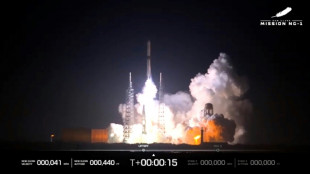
-
 Chinese give guarded welcome to spending subsidies
Chinese give guarded welcome to spending subsidies
-
World Bank plans $20 bn payout for Pakistan over coming decade

-
 Indian Bollywood star Saif Ali Khan stabbed in burglary
Indian Bollywood star Saif Ali Khan stabbed in burglary
-
Taiwan's TSMC says net profit rose 57% in fourth quarter

-
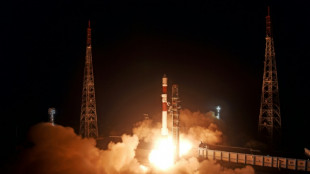 India achieves 'historic' space docking mission
India achieves 'historic' space docking mission
-
South Korea's Yoon avoids fresh questioning after dramatic arrest

-
 Olympic push for kho kho, India's ancient tag sport
Olympic push for kho kho, India's ancient tag sport
-
Dangerous Fritz sets up Monfils clash at Australian Open

-
 AFP photographer's search for his mother in the Nazi camps
AFP photographer's search for his mother in the Nazi camps
-
Life after the unthinkable: Shoah survivors who began again in Israel

-
 Israeli cabinet to vote on Gaza ceasefire deal
Israeli cabinet to vote on Gaza ceasefire deal
-
Jabeur finds it 'hard to breathe' as asthma flares up in Melbourne

-
 Swiatek powers on as Sinner, Medevedev top men's Melbourne bill
Swiatek powers on as Sinner, Medevedev top men's Melbourne bill
-
Nintendo rumour mill in overdrive over new Switch

-
 Biden warns of Trump 'oligarchy' in dark farewell speech
Biden warns of Trump 'oligarchy' in dark farewell speech
-
Superb Swiatek sets up Raducanu showdown at Australian Open

-
 Asian stocks follow Wall St higher on welcome US inflation data
Asian stocks follow Wall St higher on welcome US inflation data
-
Toyota arm Hino makes deal to settle emission fraud case

-
 Fire-wrecked Los Angeles gets a break as winds drop
Fire-wrecked Los Angeles gets a break as winds drop
-
Superb Swiatek races into third round at Australian Open


South America sweats under high temps -- in the middle of winter
Far away from the extreme summer temperatures of the northern hemisphere, Southern Cone countries such as Chile and Argentina are also experiencing record heat, but in the middle of what is supposed to be their winter.
On Tuesday, the mountain town of Vicuna in central Chile hit 37 degrees Celsius (almost 99 degrees Fahrenheit).
"It's been more than 70 years since a temperature like this was recorded" in Vicuna, Chilean meteorologist Cristobal Torres told AFP.
Unusually high temperatures were also recorded 450 kilometers (280 miles) south in the capital Santiago: 24C (75F) on Wednesday, with similar levels forecast for Thursday and Friday.
Meanwhile in Buenos Aires, the temperature exceeded 30C (86F) on Tuesday, making it the highest August 1 temperature since record-keeping began, according to Argentina's National Meteorological Service. The average August temperature in Buenos Aires is usually between 18C (64F) and 9C (48F).
Several cities across Uruguay also recorded temperatures of 30C (86F) on Wednesday.
"What we are experiencing is the combination of two phenomena: a global warming trend due to climate change plus the El Nino phenomenon," said Chile's Environment Minister Maisa Rojas, a climatologist.
"When El Nino ends, the global weather situation should stop being so extreme," she said.
An El Nino event is characterized by increased Pacific Ocean temperatures, causing rainfall, floods and avalanches in western South America, as well as heat waves.
Santiago, Buenos Aires and Montevideo are expected to return to normal temperatures in the coming days, but it is believed that similar heat waves will occur with increasing frequency.
"It is very likely that the heat record will be broken this year (in Santiago), and that is extraordinarily abnormal. Ten years ago we had two heat waves a year and now we are talking about nine," explained University of Santiago climatologist Raul Cordero.
One of the most significant impacts of the warm weather is on snowpacks in the mountains, which are vital for the water supply in Chile's capital.
"Winter heat waves have devastating effects on glaciers and snow," Cordero said.
Rojas also warned about the effects of heat at the poles.
"The ice around the polar areas is at minimum levels," she said on X, formerly known as Twitter.
"Especially around Antarctica, where at this time of year sea ice grows to reach a maximum in September, it is at a historic minimum."
P.M.Smith--AMWN

